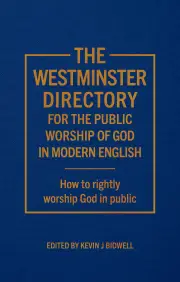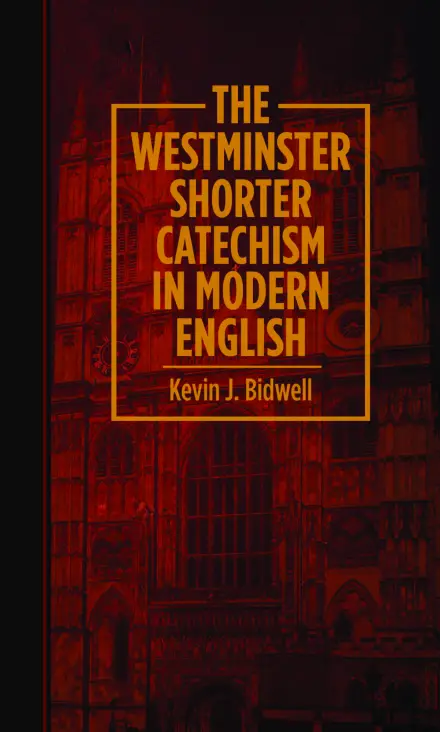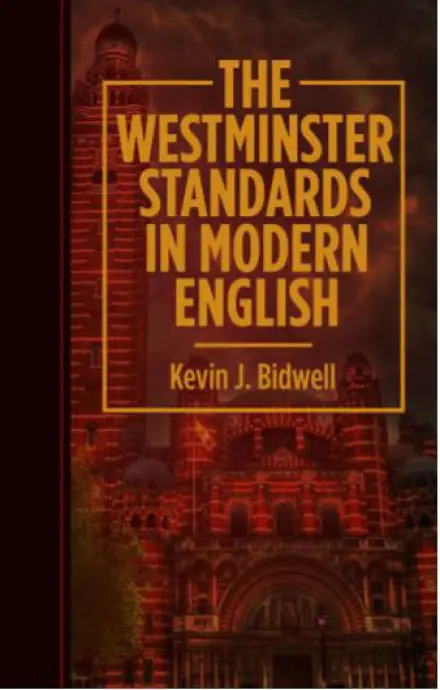An excellent resource
Does it really matter how we worship God? What does Scripture say about how we should order our public worship?
During the Reformation there were two main schools of thought with regards to public worship - the “Normative Principal” which taught that whatever is not prohibited in Scripture is permitted in worship, whilst the Regulative Principle taught that public worship should be ordered in accordance with the commands of Scripture. It is clear to see that both of these approaches to worship will look very different in practice!
So the Westminster Directory for the Public Worship of God (DPW) is a liturgical manual that was first published by the Westminster Assembly in 1645 and it is part of the Westminster Standards. It was aimed at reforming the church’s worship by prescribing a framework for public worship that is focused on Scripture.
In this modernised version, the DPW is clearly presented in modern English in order to make it accessible to the modern reader. The editor Kevin J. Bidwell has also gathered together a series of helpful essays on some of the Sub-Directories of the DPW from some leading contemporary Presbyterian theologians. Terry Johnson’s essay on the continuity between Calvin and the Westminster Puritans explains how it is not just the form of worship that matters, but the attitude towards the worship itself, since worship comes from the heart. I particularly appreciated the chapter on Public Prayer before the sermon by Maurice J. Roberts which was full of some very important practical advice in the leading of public prayers.
In conclusion, this modernised version of the DPW is an excellent resource, it is a definitive guide for the ordering of public worship that will prove to be an essential worship handbook for ministers.
*Disclaimer: @10ofthose kindly provided me with a complimentary copy in exchange for an honest review.
Gareth Dicks @biblebookstheology
Biblical, accessible, engaging and well written
What is worship? What does God require from us in worship? And what can we learn from the Westminster Assembly of Divines?
In this modernised version of The Westminster Directory of Public Worship (DPW), a number of contributors seeks to answer these questions, spurring the reader to “increasingly zealous biblical faithfulness”
The book contains Sub-directories in the DPW pertaining to Public Worship. Several standout essays were ‘Prayer after the Sermon’, ‘Public Reading of the Holy Scriptures’, and ‘Sanctification of the Lord’s Day’. Roland S Barnes’ survey of the Sabbath was especially helpful, as he explored the universal & eternal principles of the Sabbath.
I also enjoyed Dr Terry L Johnson’s work concerning ‘Worship from Calvin to Westminster’ in which Johnson explored the continuity, common theology and substantial agreements between Calvin’s liturgies and that of the DPW. I especially found the section on the five basic elements (Prayer, Singing, Scripture Reading, Preaching and Sacraments) of public worship insightful, as both Calvin and the Westminster Assembly had a desire and a conviction that worship must be ‘according to Scripture’ although they “shared a concern for balance between correct form and freedom that is necessary for heart religion” p. 21
At the back of the book you’ll find the actual modernised Westminster Directory itself which I read prior to the Sub-directories, as this just made sense to me.
Kevin J Bidwell did an excellent job with the editing of this book and the updated language makes this very accessible.
Much of what is included in the DPW is bygone tradition to many Evangelicals, however, what is contained in it is biblical, meaning that God cares about it, and therefore has prescribed how we should approach Him in worship.
I believe many church leaders (and Christians) would benefit from these essays, and would love to see a resurgence of the content found in this book.
Biblical, accessible, engaging and well written - I recommend
Craig Green
A much-needed guide for the church today
The Westminster Directory for Public Worship, established by the Westminster Assembly in 1644 to replace the Book of Common Prayer, was designed to address the demands of the 1640 Root and Branch petition against the episcopal system and its liturgy. Approved by both the English and Scottish Parliaments, the Directory offered a flexible approach to worship, emphasizing Scripture reading, prayer, and preaching, and providing guidance on sacraments and pastoral care. Developed by a committee known as the Westminster Divines, this directory reflects the regulative principle of worship.
But what can seventeenth-century statements teach the church about contemporary worship today, in the twenty-first century? The Westminster Directory for the Public Worship of God in Modern English, edited by Kevin J. Bidwell and published by Evangelical Press, answers this question among many others, enabling the church to assess its biblical faithfulness as expressed through its public worship practices and preferences. This book follows Bidwell’s 2017 work of a similar nature, The Westminster Standards for Today.
This volume contains a preface by Joseph A. Pipa Jr. and a preliminary essay by Terry L. Johnson on continuity or discontinuity—“Worship from Calvin to Westminster.” Johnson provides the theological foundations of the Directory and discusses its simplicity and spirituality. He also evaluates its contents and influence over the centuries.
The succeeding chapters contain essays on some of the sub-directories in the Directory for Public Worship. This includes contributions from George Curry ("Of the Assembling of the Congregation, and Their Behaviour in the Public Worship"), Timothy K. Hoke ("Of Public Reading of the Holy Scriptures"), Maurice J. Roberts ("Of Public Prayer Before Sermon"), Joseph H. Fowler and Joseph A. Pipa Jr. ("Of the Preaching of the Word"), Johannes M. Muller ("Of Prayer After the Sermon"), Chad T. Bailey ("Of the Administration of the Sacraments"), Kevin J. Bidwell ("Of the Celebration of the Communion"), Roland S. Barnes ("Of the Sanctification of the Lord’s Day"), and Warren J. Peel ("Of the Singing of Psalms").
The Directory itself (in Modern English) is in the following section. Bidwell reformatted it and involved light editing to remove archaic English phrases, but the content and doctrines remain completely unchanged. Bidwell also included appropriate paragraphs to enhance readability. In lengthy sections, he added subheadings to improve memorability of the material.
Aside from its modernized English, I appreciate that it is formatted in a reader-friendly way, which makes it more approachable and pleasant to read. Bidwell has done an exceptional job editing the directory and has succeeded in making it accessible to the church today.
Final thoughts:
The Westminster Directory for the Public Worship of God in Modern English is a pastoral masterpiece and a much-needed guide for the church today, especially at a time when many depart from the foundational teachings of the Bible. I hope to see future works from Bidwell on the other contents of the Westminster Standards.
Marc Daniel
An important and timely book.
This is an important and timely book. There is no subject of greater importance than the worship of Almighty God. In our time large parts of the Church has been led astray by subjective and man-centred methods of worship. This helpful reprinting of the Directory of Worship offers us an alternative approach, gleaned from the wisdom of the saints who came before us. It guides us towards a better and more Biblical way to worship our glorious Triune God. The essays included with the directory are all helpful in explaining and applying the teaching of the Directory to today. May the Lord use it to continue the reformation of His Church and for His glory
Matthew Jolley





